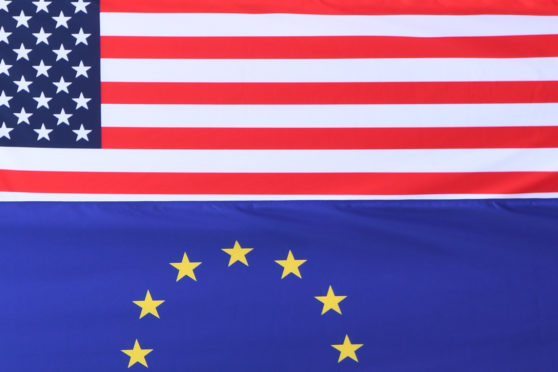Extraordinary. Boris Johnson walks into Number 10 and before we know it there is a well-advertised love in between him and Donald Trump.
This, only a short time after a leak from somewhere high in the British Cabinet office results in the resignation of Britain’s Ambassador in the US for saying something harshly critical of the president – and Mr Johnson was not overly critical of the way the ambassador was forced out.
Is this really a surprise? I don’t think so.
A sub plot to the Brexit debate is the struggle between those who want us to be part of Europe and those who would rather see us more closely linked to the English-speaking world – Canada, Australia, New Zealand and the US. This has always been something of a fault line in British politics when it comes to membership of the EU. The Brexiteers believe that our future lies in the wider world while Remainers have always seen our future in Europe. The two are not mutually exclusive in my view but Donald Trump and Boris Johnson (and Nigel Farage) have a joint agenda here and it is to take Britain away from its attachment to the EU and create what they see as a more independent UK with close links to the US and Commonwealth.
These two views of our future reflect the way Britain, following the industrial revolution, became the 19th century superpower and saw itself as ‘different’ to the rest of Europe – remember the alleged headline from the early 20th century – ‘Fog in the Channel, Continent isolated’. Well, whether there ever was such a headline is questionable but the attitude it reflected was real enough and it still finds echoes today.
My view is that Britain needs the EU and the EU needs Britain. Our shared history shows that we can never be entirely separate from each other. But it is also true that many British people maintain close links with Commonwealth countries and especially the English-speaking ones. Many people here have close links through family and friends with people in those nations and the president boasts of his family ties with Scotland. It is not just the golf courses.
In this respect he is not different to the majority of US presidents, nearly all of whom claim ancestral links with some part of the UK or Ireland.
Language is an important part of this sense of identity. There are many Commonwealth countries which, although having a very different culture, have English as one of their main languages. English is an official language of India for example. In the last year immigration from non EU countries has overtaken immigration from the EU which might be a painful lesson for those who believe that we can manage in the modern world without people having international mobility.
The referendum that is taking us out of the EU revealed, indeed emphasised, the deep splits in British society about our identity and where we fit in the modern world. The British attachment to the EU was always more about economics than politics. So, the struggle for the future of British identity and our role in the world is not going to be resolved quickly. Clearly President Trump wants Britain to be out of the EU and he wants a closer relationship between the English-speaking countries. His current offer of a new trade deal with the UK, an offer that is also being made by the Australian prime minister is a clear indication of the policy preferences of these two countries. Boris Johnson and his heavily pro-Brexit Cabinet echo this.
There is of course the not insignificant matter of the British Parliament being strongly opposed to a ‘no deal’ Brexit. How does this get resolved? Well, I am not the first to point out that Boris might, when pushed, go for a general election. In the present state of politics anything is possible but I for one would rather we kept the EU and the western world in a close relationship – we need it in a world where nationalism is on the rise and authoritarian states are increasingly assertive.
The choice for Britain is challenging. We could become a central part of the emerging super state of Europe – it will take a long time for that to happen but once you have a single market and a single currency it is only a matter of time before you have a single Chancellor of the Exchequer and a stronger central bank.
That is the process taking place in Europe before our eyes. Alternatively, we could opt out of this process and go for the wider world with the English speaking nations at the centre of our future relationships. If we make that choice, we had better make sure we are not cut out of EU markets (the largest and richest market in the world) and we had better make sure that the rest of the world and Donald Trump’s vision is not a chimera.
For my part I think we should remain an important link between the EU and the wider world – the two are not incompatible but it does mean that a ‘no deal ’Brexit is a dangerous gamble.
Clive Soley is a former MP and chair of the Parliamentary Labour Party who is now vice-chair of the Scottish Peers Association and a member of the House of Lords EU Select sub committee on home affairs. He lives in the Highlands.
